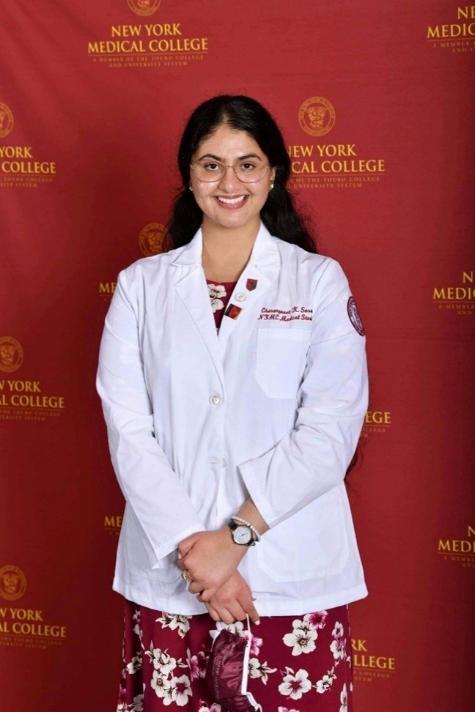
NYMC Researchers Find Alternative Treatment for Middle Cerebral Artery Aneurysms Offers Positive Results
Pipeline Embolization Device Procedure To Treat Middle Cerebral Artery Aneurysms Shows Little Evidence Of Negative Neurological Outcomes

A new study by New York Medical College (NYMC) researchers on the use of the pipeline embolization device (PED) procedure to treat middle cerebral artery (MCA) aneurysms found little evidence of negative neurological outcomes, making it a good alternative for treatment of patients with complex cases of MCA that may not respond well to traditional methods of coiling and clipping.
“While PED has long been used to treat internal carotid artery aneurysms, there has been more hesitancy to use it to treat MCAs over concerns that it could potentially block off or ‘jail’ smaller vessels in the path of the device and trigger thromboembolic events in areas that were not meant to be targeted,” said Charanpreet Sasan, SOM Class of 2024, who worked alongside her mentor, Justin Santarelli, M.D., assistant professor of neurosurgery, who specializes in endovascular surgery, and other NYMC faculty for the study.
The study examined patients who had undergone the PED procedure for the MCA aneurysm 12 months previously using CT perfusion imaging to determine whether jailing occurred and if it led to any deficit or delay in perfusion that could threaten the blood supply integrity and lead to neurological symptoms.
“In the majority of the cases, we found that the patients did not experience jailing and all the patients remained neurologically intact after the PED procedure,” said Ms. Sasan. “In patients that did experience jailing, there were no deficits or delays in perfusion as collateral circulation developed to take over any potential compromised blood flow territory. These findings indicate that PED is a safe tool to use for the management of complex MCA territory aneurysms when traditional methods of coiling or clipping may not be options.”
Ms. Sasan first became interested in the areas of neurology and neurosurgery during her undergraduate study in kinesiology, while working with patients with spinal cord injury and multiple sclerosis. That interest was further solidified during her first-year neuroscience course at NYMC, which provided her an opportunity to delve into nervous system disorders and dysfunctions.
“This project has been a great learning experience for me,” said Ms. Sasan. “I have always had an interest in neurology and neurosurgery, particularly the endovascular area and topics like strokes, aneurysms and other intracranial injuries. As I went through the literature review process, patient data collection and analysis, the writing and editing process, I learned about the work that goes into writing a quality research paper. I also was able to learn from my PI and mentor Dr. Santarelli about the clinical aspects of the data and hone my imaging reading skills. Overall, it has been a very positive experience, and I am excited to become more involved in research!”

